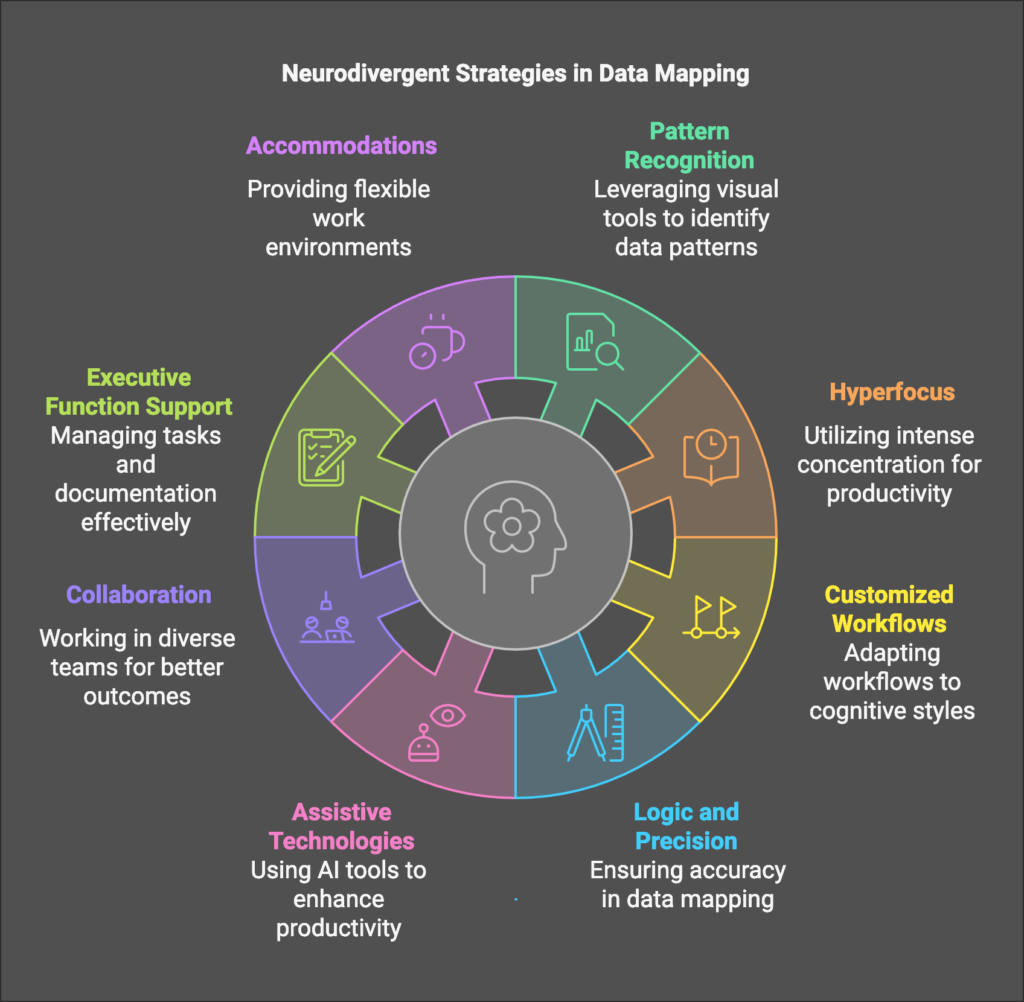
Neurodivergent individuals often bring unique perspectives, cognitive styles, and skills to the workplace that can enhance their ability to map and analyze data quickly and effectively for companies like Embed Intelligence. Here are some strategies and practices neurodivergents can leverage:
1. Leverage Pattern Recognition Skills
Many neurodivergent individuals, particularly those with autism or ADHD, excel in identifying patterns, anomalies, and relationships in complex datasets. To maximize these skills:
- Use Advanced Visualization Tools: Tools like Tableau, Power BI, or D3.js can help create visual patterns that are easier to identify and interpret.
- Automate Data Cleaning: Automating repetitive tasks reduces cognitive load and allows more focus on pattern analysis.
2. Utilize Hyperfocus for Data Mapping
The intense focus often experienced by neurodivergents can be harnessed for high-productivity work sessions:
- Break Work into Blocks: Structured work periods (e.g., Pomodoro technique) can help maintain focus without burnout.
- Minimize Distractions: Use noise-canceling headphones or apps like Focus@Will to create an optimal work environment.
3. Customize Workflow to Fit Cognitive Styles
Flexible workflows can accommodate different processing preferences:
- Visual Learners: Use mind maps or flowcharts to structure data relationships.
- Sequential Thinkers: Map data step-by-step using ETL pipelines or hierarchical schemas.
- Spatial Thinkers: Use GIS (geographic information systems) or 3D modeling tools for spatial data mapping.
4. Emphasize Strengths in Logic and Precision
Neurodivergents often have heightened attention to detail, which is critical in data mapping:
- Use Data Validation Tools: Employ tools like Talend or Collibra to ensure accuracy.
- Standardize Processes: Create repeatable workflows to reduce errors.
5. Implement Assistive Technologies
Assistive tools can enhance productivity:
- Code Assistants: Use AI-powered coding tools like Copilot or Tabnine to streamline data scripting.
- AI-Powered Data Wrangling: Tools like Alteryx or DataRobot simplify data preparation and mapping.
6. Foster Collaboration Through Diverse Teaming
Neurodivergents thrive in inclusive, diverse environments where their unique viewpoints are valued:
- Pair Programming: Collaborate with team members to cross-check work and brainstorm ideas.
- Role Specialization: Assign specific roles in the data mapping process that align with individual strengths.
7. Build Systems Around Executive Function Needs
Support challenges with executive function using:
- Task Management Tools: Apps like Asana, Trello, or Notion can help track progress.
- Simplified Documentation: Use concise and visual documentation to streamline understanding.
8. Offer and Seek Support
Neurodivergents should feel empowered to request accommodations that help them thrive:
- Flexible Hours: Allow work during peak productivity times.
- Clear Communication: Ensure expectations and tasks are well-defined.
Example Impact for Embed Intelligence:
- Faster Data Transformation: Neurodivergent team members can use hyperfocus and pattern recognition to accelerate ETL processes.
- Enhanced Accuracy: Precision-driven workflows reduce errors in data mapping, crucial for industries like healthcare and finance.
- Innovative Insights: Diverse cognitive approaches lead to novel interpretations of data relationships.
By tailoring strategies to their strengths and preferences, neurodivergent individuals can be key contributors to the success of companies like Embed Intelligence.
